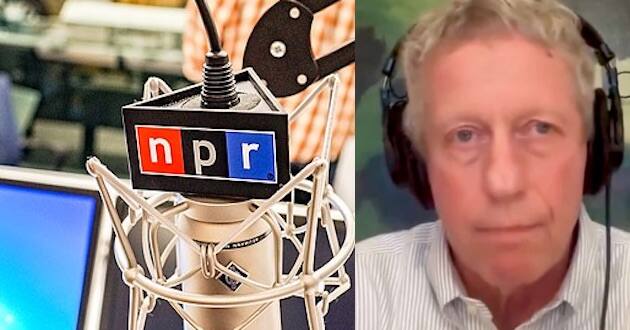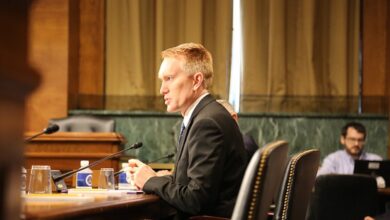Veteran NPR editor blows whistle on newsroom bias

A longtime National Public Radio editor has confirmed what most listeners already knew – as a “public” media entity, NPR does not reflect America. Democrats outnumber Republicans in the newsroom by a margin of 87-0, according to senior business editor Uri Berliner. You can listen to an interview with him below.
Berliner, who has won numerous awards for his NPR reporting, pointed in particular to its flawed coverage of the Hunter Biden laptop, Russiagate and the COVID lab-leak theory, and he also claimed NPR leadership’s reaction to the George Floyd killing in 2020 was to declare systemic racism was “a given” and “our mission was to change it.” He said the lack of “viewpoint diversity” had spilled over into how NPR covered such topics as the Israel-Gaza war and avoided terms such as “biological sex” in its reporting.
“An open-minded spirit no longer exists within NPR, and now, predictably, we don’t have an audience that reflects America,” he began the column.
He goes on to say, “I’m offering three examples of widely followed stories where I believe we faltered. Our coverage is out there in the public domain. Anyone can read or listen for themselves and make their own judgment. But to truly understand how independent journalism suffered at NPR, you need to step inside the organization.”
“So on May 3, 2021, I presented the findings at an all-hands editorial staff meeting,” Berliner wrote. “When I suggested we had a diversity problem with a score of 87 Democrats and zero Republicans, the response wasn’t hostile. It was worse. It was met with profound indifference. I got a few messages from surprised, curious colleagues. But the messages were of the ‘oh wow, that’s weird’ variety, as if the lopsided tally was a random anomaly rather than a critical failure of our diversity north star.”
Berliner, who has been at NPR for 25 years, “eagerly” voted against Donald Trump in 2016 and 2020 but wrote that he found NPR’s advocacy-style coverage of his presidency wrongheaded. He said he’d had regular conversations with news leaders about the homogeneous political culture, to no avail.
LISTEN TO BERLINER INTERVIEWED below or on Apple Podcasts HERE.
“Throughout these exchanges, no one has ever trashed me,” he said. That’s not the NPR way. People are polite. But nothing changes. So I’ve become a visible wrong-thinker at a place I love. It’s uncomfortable, sometimes heartbreaking.”
Berliner noted that polling showed NPR’s audience had become significantly less diverse over the years as well, going from slightly left-leaning overall in 2011 to overwhelmingly so by 2023.
“Only 11 percent described themselves as very or somewhat conservative, 21 percent as middle of the road, and 67 percent of listeners said they were very or somewhat liberal,” he said “An openminded spirit no longer exists within NPR, and now, predictably, we don’t have an audience that reflects America. That wouldn’t be a problem for an openly polemical news outlet serving a niche audience. But for NPR, which purports to consider all things, it’s devastating, both for its journalism and its business model.”
NPR was quick to defend itself, not waiting for an internal investigation to see if the accusations had merit.
NPR’s chief news executive, Edith Chapin, wrote to staff Tuesday afternoon the news leadership team rejected Berliner’s assessment.
Watch a clip of Uri below:
“We’re proud to stand behind the exceptional work that our desks and shows do to cover a wide range of challenging stories,” she wrote. “We believe that inclusion — among our staff, with our sourcing, and in our overall coverage — is critical to telling the nuanced stories of this country and our world.”
However, the problem at NPR is something all of mainstream media is grappling with. New York Times publisher A.G. Sulzberger warned last year against journalists embracing a stance of what he calls “one-side-ism”: “where journalists are demonstrating that they’re on the side of the righteous.”
“I really think that that can create blind spots and echo chambers,” he said.
Berliner’s account of what’s happening behind the microphone at NPR may have already been noticed by listeners. The media outlets mobile web traffic is down 75% from 2022.
He ends by offering path forward.
“With declining ratings, sorry levels of trust, and an audience that has become less diverse over time, the trajectory for NPR is not promising. Two paths seem clear. We can keep doing what we’re doing, hoping it will all work out. Or we could start over, with the basic building blocks of journalism. We could face up to where we’ve gone wrong. News organizations don’t go in for that kind of reckoning. But there’s a good reason for NPR to be the first: we’re the ones with the word public in our name,” he states.
–Dwight Widaman | Metro Voice
Uri Berliner image: Video.
NPR photo: Ted Eytan Creative Commons Attribution-Share Alike 2.0.






